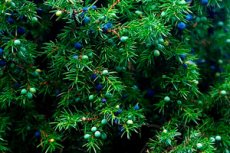Medical expert of the article
New publications
Preparations
Juniper for bronchitis coughs
Last reviewed: 04.07.2025

All iLive content is medically reviewed or fact checked to ensure as much factual accuracy as possible.
We have strict sourcing guidelines and only link to reputable media sites, academic research institutions and, whenever possible, medically peer reviewed studies. Note that the numbers in parentheses ([1], [2], etc.) are clickable links to these studies.
If you feel that any of our content is inaccurate, out-of-date, or otherwise questionable, please select it and press Ctrl + Enter.

Juniperus communis is not only a beautiful ornamental plant, but also one of the natural healers, the use of which gives good results in the treatment of bronchitis, pneumonia, bronchial asthma and other diseases of the bronchopulmonary system. In these pathologies, it has a pronounced anti-inflammatory effect.
Dosing and administration
Edible juniper berries are commonly used as herbal medicinal raw materials, from which a healing decoction is prepared. For 1 tbsp. of dried berries, you will need 2 cups of hot water. Boil the mixture over low heat for 20 minutes. When the decoction has cooled, strain it and take it three times a day. It is best to do this after meals. A single dose of the decoction is 1 tablespoon.
Contraindications
Compositions with juniper are not dangerous to health, but they can still cause harm to expectant mothers (during pregnancy they can provoke a miscarriage), people with chronic pathologies of the digestive system and, of course, those who have increased sensitivity of the body to substances contained in juniper fruits.
Side effects juniper
Side effects of the plant are rare. Sometimes allergic reactions occur, irritation of the gastrointestinal mucosa is possible, which will be accompanied by nausea, pain and heaviness in the abdomen.
 [ 3 ]
[ 3 ]
Storage conditions
We harvest only the fruits of this very attractive plant, considered to be a long-liver on Earth, which we may need to treat bronchitis and other colds. The berries of the evergreen coniferous bush begin to ripen in the fall and can be collected until snow falls. The bush is prickly, so it is important to take protective gloves with you.
The collected fruits must be sorted out so that there are no needles or unripe berries among the quality raw materials. The berries must be dried in a shady place with good ventilation. If a dryer is used, the drying temperature should be low (up to 35 degrees). The dried berries should not completely wrinkle and lose their aroma.
Juniper berries are stored in cardboard boxes or glass jars with lids. They retain their properties for 3 years.
In pursuit of medicinal berries, you need to be very careful, because juniper has another type, which is called Cossack. This type of plant has leaves that are not fleshy and needle-like, but flat. The berries are almost black and have two seeds. Cossack juniper is considered a poisonous plant, and its fruits are not suitable for food.
Attention!
To simplify the perception of information, this instruction for use of the drug "Juniper for bronchitis coughs" translated and presented in a special form on the basis of the official instructions for medical use of the drug. Before use read the annotation that came directly to medicines.
Description provided for informational purposes and is not a guide to self-healing. The need for this drug, the purpose of the treatment regimen, methods and dose of the drug is determined solely by the attending physician. Self-medication is dangerous for your health.

